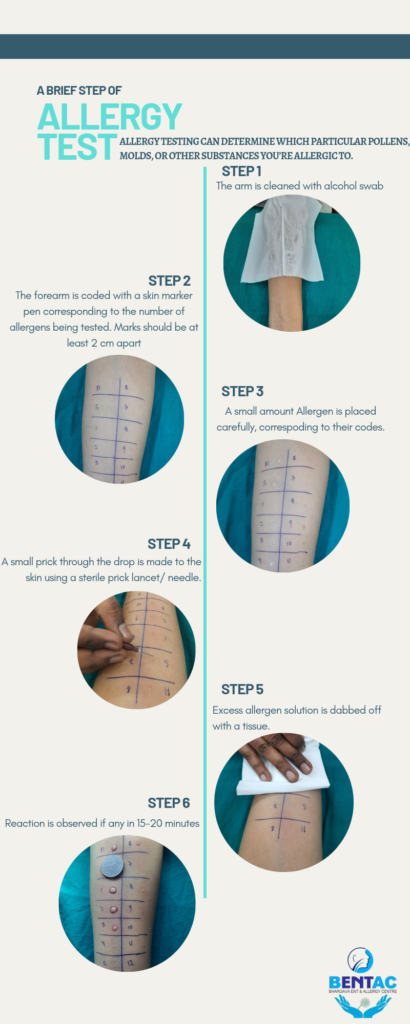Visit to the Dr Rahul Bhargava, the best ENT clinic in rohini delhi, for Food Allergy Skin Test near to you. Book an appointment by phone calls.
What Is An Allergy?
Allergy is the immune response of foreign agents like pollens, animal dander, insects, and dust mites which don’t usually bother.
How do Allergens Cause Allergies?
When we breathe or eat food, Allergens particles enter into our system and cause a reaction that produces the IgE antibody and trigger an allergic reaction in some individuals causing the symptoms.
What is the Difference Between Allergens and Triggers?
Allergens are the substances that cause allergy, while triggers are the substances that trigger the existing allergy. There are different triggers like strong smell, change in temperature, smoke, physical touch, cigarette smoke, chemicals beside others. Triggers identification and avoidance is an important part in management of allergic disease.
What are the Symptoms of Allergy?
- Running nose
- Stuffy nose/ nasal obstruction
- Repeated bouts of sneezing
- Itchy nose /throat
- Red itchy eyes
- Watering from the eyes
- Post nasal drip
- Cough
- Wheezing
- Chest tightness
- Vomiting
- Diarrhoea
- Hives or urticaria
- Rashes
- Bloating
Patients with asthma develop exaggeration of symptoms like wheezing, shortness of breath, cough or develop an acute attack.
Allergy Test Facility Available At Our BENTAC Clinic
Book your appointment with us to get treatment for your Allergy at the right time.
Address : G-17/31 Ground Floor Sector 15 Rohini Delhi 110089
How is allergy diagnosed?
History is very important in diagnosing allergies. Accurate and elaborate history helps your doctor to find out triggers and the offending allergens. Allergies can have manifestations in different parts of your body.
This is followed by an evaluation of the nasal cavity with an endoscope. The signs of allergy include hypertrophy of the inferior turbinate and inflammation in the nose. This test also rules out concurrent sinusitis or nasal polyps.
A Pulmonary function test helps in the evaluation of the chest and requirement of medications for chest.
Your doctor may order certain blood tests like Serum IgE and AEC.
The allergy test namely Skin prick test helps in the identification of the offending allergens.
- Skin Prick Test (SPT): Skin Prick Test can be performed on the forearm or on the back of the patient. In this test the doctor or technician will first put codes on your body and one by one antigen drop is put over the forearm followed by a small prick. A positive test denotes formation of small bumps and redness in the same area. The size of the bump is measured and noted. SPT is a much more reliable test and gives quick results. SPT is cheaper too as compared to other tests. This test is helpful for starting allergen specific immunotherapy as well.
- Specific IgE test: Blood is taken and processed in the lab to know the amount of antibodies in the blood. The higher the number, more the chances of that allergen causing the allergy. This test is useful for children who are afraid of needles or for patients who are not able to stop the allergy medicines for 3 days.

How to Treat Allergies?
The most important step in treatment of allergy is diagnosis.
There are three main pillars for allergy management. Firstly; Allergen and triggers avoidance. Once you know that you are allergic to a particular allergen your doctor will advise you on certain ways to get rid of those allergens. Second is medications. Various medications are helpful in allergy treatment, your doctor will advise you on medication according to the system involved and symptoms. The medications for the allergy are effective but the effect is not long lasting. Third, allergen specific Immunotherapy.
Immunotherapy
Immunotherapy works like a vaccine. Your body responds to a particular allergen, given in gradually increasing doses. This helps in developing immunity or tolerance to the allergen. Immunotherapy decreases sensitivity to allergens and often leads to long-lasting relief of allergy symptoms; this makes it a cost effective, beneficial treatment approach for many people.
Immunotherapy can be given either by subcutaneous route or sublingual route. This involves regular administration of gradually increasing allergen extracts over a period of a few years. Although the medicines for allergies are very effective, the effect is not long lasting. Immunotherapy is the closest thing that we have for ‘cure’ of allergy, it decreases the symptoms of many allergies, decreases the medicine needed and it can prevent the development of new allergies and in children, it can prevent the progression of allergic disease from allergic rhinitis to asthma.
How to prevent dust mite allergy and frequent exacerbation?
Allergen avoidance is very important in the treatment and prevention of allergies.
Dust mite can be avoided in many cases with precautions.
- Avoid fabric curtains and carpets, especially in the bedroom.
- Vacuuming your mattress on an alternate basis helps to get rid of dust mites (if you have a vacuum cleaner with a HEPA filter ). Do use a mask while vacuuming.
- Once a week, lay down your mattress in the sun, this helps in getting rid of HDM.
- Use a damp mop (Pochha) in the room to get rid of those HDM.
- Use dustproof pillows and mattress covers or synthetic bedding.
- Soft toys and stuffed animals carry a high load of dust mites and wash them regularly.
Failure to respond to allergy shots may be due to several factors:
• Missing allergens not identified during the allergy evaluation.
• High levels of allergen in the environment.
• Significant exposure to non-allergic triggers, such as tobacco smoke, pollution.
Stay healthy, Stay safe.
